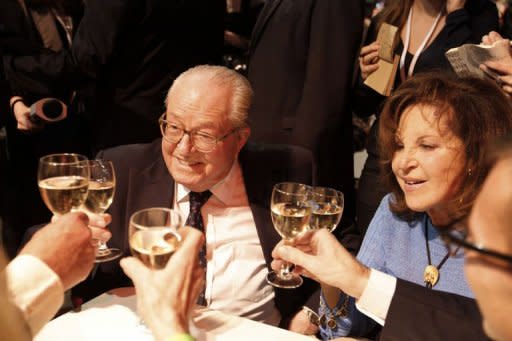Marine Le Pen: the new, and old, face of French far right
Marine Le Pen, who made a spectacular French presidential election debut Sunday, has sought to transcend the bigoted image of the National Front she inherited from her firebrand father Jean-Marie. The 43-year-old lawyer won 18.2 to 20 percent in Sunday's first-round of the French presidential election, official estimates said, the highest ever score for her anti-immigrant, anti-European, far-right party. This did not allow her to go through to the second round on May 6 -- in which President Nicolas Sarkozy squares off against Socialist rival Francois Hollande -- but it puts her party in its strongest position yet. "The battle of France has just begun," she declared Sunday after the estimates were released, adding that "we have exploded the monopoly of the two parties" -- the Socialists and Sarkozy's right-wing UMP. The telegenic blonde had been hoping to repeat her father's stunning showing in 2002 when he defeated Socialist Lionel Jospin in the first round before losing to Jacques Chirac in the second. Calling for "economic patriotism" and vowing to leave the eurozone, she railed against globalisation and the "Islamisation" of France, initially gaining some ground with attacks on the production of Islamic halal meat. Sarkozy sought to steal her thunder on two key issues for the far-right -- immigration and security -- with his calls for fewer immigrants and his handling of deadly attacks lat month by an Islamist extremist in Toulouse. Le Pen, a seasoned politician before she took over the party last year, is credited with offering a softer image of the party dominated by her father since he founded it in 1972, and tainted by his extremist outbursts. But critics say she represents the same old hard-right National Front in new clothes, playing on white voters' sensitivities over France's Muslim population, estimated at up to six million. The twice-divorced mother of three was elected to local and regional council posts and in 2004 to the European Parliament, and also served as the National Front's legal head. Analysts see her as part of a new age of far-right leaders across Europe seeking to shake off the fascist stigma of their predecessors. "She embodies a new political generation in the National Front, which wants to modernise it and stop it seeming old-fashioned," said Nonna Mayer, a specialist on the far right at the Sciences-Po school in Paris. Like her father, Marine Le Pen has not avoided causing outrage with outspoken comments. Last year she compared Muslims praying in the streets outside overcrowded mosques in France to the Nazi occupation. Jean-Marie Le Pen on Sunday denied that he had already been eclipsed by his youngest daughter, said: "I passed her the baton. She runs faster than me, then that's so much for the better."



